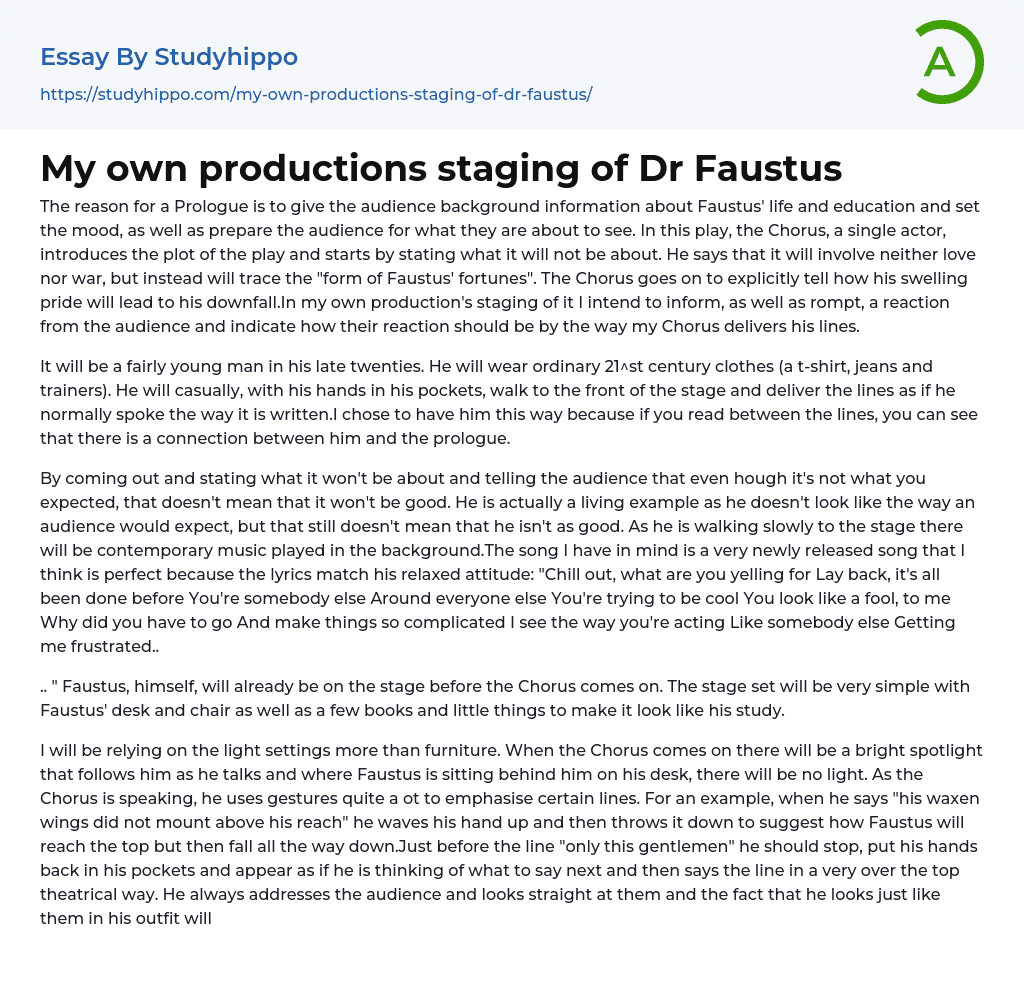The Prologue serves the purpose of providing context for Faustus' life and education, setting the atmosphere, and preparing the audience for what is to come. The Chorus, played by a single actor in this play, introduces the plot by stating that it will not involve love or war but instead follow Faustus' fortunes which will lead to his downfall due to pride. In my production, I aim to inform and elicit a response from the audience through the performance of my Chorus while using their reactions as a guide for delivering lines.
In the prologue, there is a connection between the main character and a man in his late twenties who dresses casually in modern attire. The man will come to the front of the stage with his hands in his pockets and speak naturally, reflecting his usual way of speaking. This parti
...cular character was selected because there is an implied relationship between him and the prologue.
As he approaches the stage, contemporary music will provide background sounds. Although his appearance may not meet audience expectations, he assures them that this does not diminish the quality of his performance. He serves as a living example of this philosophy. In order to convey his relaxed demeanor, the lyrics of a recently released song seem particularly fitting - "Chill out, what are you yelling for Lay back, it's all been done before You're somebody else Around everyone else You're trying to be cool You look like a fool, to me Why did you have to go And make things so complicated I see the way you're acting Like somebody else Getting me frustrated..."
Before the Chorus enters, Faustus
will already be on stage. The stage design will consist of Faustus' study, featuring his desk, chair, and a collection of books and small details.
The furniture will be less important than the lighting in my performance. During the Chorus's speech, he will be illuminated by a bright spotlight while Faustus, sitting behind him at his desk, will remain in darkness. The Chorus will use many gestures to emphasize certain lines, such as waving his hand up and down to represent Faustus's rise and fall. Just before uttering the line "only this gentlemen," the Chorus should stop, put his hands in his pockets, and appear to be considering his next words. Then he should deliver the line with exaggerated theatricality, addressing the audience directly and maintaining eye contact throughout. The Chorus's attire, which will resemble that of the audience members, should make the performance more intimate.
In his delivery, he adopts a brisk and upbeat pace, but his tone turns negative and he shakes his head when he reaches the phrase "till, swollen with cunning". This gesture conveys his sympathy for Faustus and his future behavior. Notably, he stresses words such as "devilish", "necromancy", and "magic" as they are crucial to the play's central theme. To create a sense of mystery and unease, he deepens his voice when pronouncing them. To conclude, he faces the audience while pointing in the direction of Faustus with his head, indicating that he is too afraid to look at him directly.
Once the performer exits the stage, they should nonchalantly put their hands back in their pockets. At this point, the spotlight will shift away with the Chorus. The lighting will turn
a deep red and darken, and Elizabethan music will softly play in the background to enhance the atmosphere. I deliberately chose darker tones for Faustus to create an air of mystery around him, considering his dealings in black magic. Conversely, the Chorus had a more straightforward demeanor. This contrast serves to separate the Chorus from Faustus, and the music change accentuates the different historical eras. I believe we won't require any projections.
The way I have presented the Prologue and Chorus would differ greatly from how an early 17th Century Director would have done it. The Chorus would have been straightforward and predictable for the audience, portrayed by an elderly man in what would have likely been a Greek foyer costume. Background music and stage lights were not yet in existence, and Faustus would have appeared on stage once the Chorus had exited. The tone of the production would be serious and harrowing, without the need to deliberately emphasize any words in order to create a sense of mystery. Simply the mention of necromancy alone would be terrifying to viewers. The Chorus would not have been instructed to engage in much movement or casual behaviors such as placing their hands in their pockets, but instead to act as a refined gentleman standing on one side of the stage and making grand gestures with his hands so that all audience members could easily see.
Faustus would probably stand rather than sit on stage due to the need for big gestures to be visible to all. This is difficult to achieve while seated and without a spotlight.
- Nightclub essays
- Accident essays
- Awareness essays
- Benefits of Volunteering essays
- Challenges essays
- Childhood Memories essays
- Decision essays
- Driving essays
- Event essays
- Excellence essays
- Expectations essays
- Failure essays
- Farewell essays
- Flight essays
- Gift essays
- Growing Up essays
- Ignorance essays
- Improve essays
- Incident essays
- Knowledge essays
- Luck essays
- Memories essays
- Mistake essays
- Obstacles essays
- Overcoming Challenges essays
- Party essays
- Peace Corps essays
- Personal Experience essays
- Problems essays
- Sacrifices essays
- Struggle essays
- Success essays
- Trust essays
- Vacation essays
- Visit essays
- Volunteering essays
- Allegory essays
- Alliteration essays
- Comedy essays
- Comic book essays
- Drama essays
- Dystopia essays
- Fairy Tale essays
- Fantasy essays
- Fiction essays
- Ghost essays
- Gothic Fiction essays
- Gothic Literature essays
- Irony essays
- Legend essays




